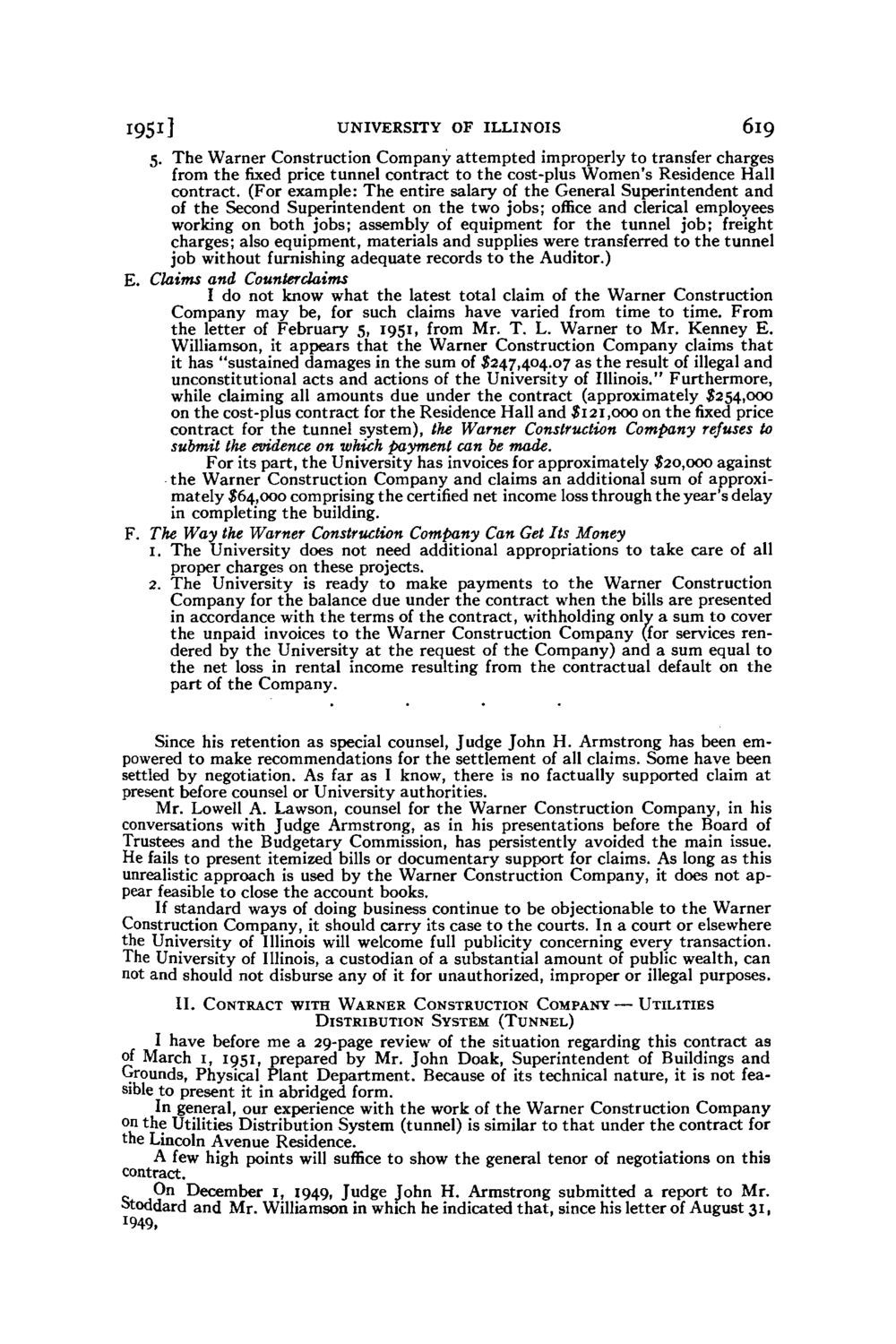| |
| |
Caption: Board of Trustees Minutes - 1952
This is a reduced-resolution page image for fast online browsing.

EXTRACTED TEXT FROM PAGE:
i95i] UNIVERSITY OF ILLINOIS 619 5. T h e Warner Construction Company attempted improperly to transfer charges from t h e fixed price tunnel contract to the cost-plus Women's Residence Hall contract. (For example: The entire salary of the General Superintendent and of the Second Superintendent on the two jobs; office and clerical employees working on both jobs; assembly of equipment for the tunnel job; freight charges; also equipment, materials and supplies were transferred to the tunnel job without furnishing adequate records t o the Auditor.) E. Claims and Counterclaims I do not know what the latest total claim of the Warner Construction Company may be, for such claims have varied from time to time. From the letter of February 5, 1951, from Mr. T. L. Warner to Mr. Kenney E. Williamson, it appears that the Warner Construction Company claims t h a t it has "sustained damages in the sum of {247,404.07 as the result of illegal and unconstitutional acts and actions of the University of Illinois." Furthermore, while claiming all amounts due under the contract (approximately {254,000 on the cost-plus contract for the Residence Hall and $121,000 on t h e fixed price contract for the tunnel system), the Warner Construction Company refuses to submit the evidence on which payment can be made. For its part, the University has invoices for approximately {20,000 against the Warner Construction Company and claims an additional sum of approximately {64,000 comprising the certified net income loss through the year's delay in completing the building. F. The Way the Warner Construction Company Can Get Its Money 1. The University does not need additional appropriations to take care of all proper charges on these projects. 2. The University is ready to make payments to the Warner Construction Company for t h e balance due under the contract when the bills are presented in accordance with the terms of the contract, withholding only a sum to cover the unpaid invoices to the Warner Construction Company (for services rendered by the University at the request of the Company) and a sum equal to the net loss in rental income resulting from the contractual default on the part of the Company. Since his retention as special counsel, Judge John H. Armstrong has been empowered to make recommendations for the settlement of all claims. Some have been settled b y negotiation. As far as I know, there is no factually supported claim at present before counsel or University authorities. Mr. Lowell A. Lawson, counsel for the Warner Construction Company, in his conversations with Judge Armstrong, as in his presentations before the Board of Trustees and the Budgetary Commission, has persistently avoided the main issue. He fails to present itemized bills or documentary support for claims. As long as this unrealistic approach is used by the Warner Construction Company, it does not a p pear feasible to close the account books. If standard ways of doing business continue to be objectionable to the Warner Construction Company, it should carry its case to the courts. In a court or elsewhere the University of Illinois will welcome full publicity concerning every transaction. The University of Illinois, a custodian of a substantial amount of public wealth, can not and should not disburse any of it for unauthorized, improper or illegal purposes. I I . CONTRACT WITH W A R N E R CONSTRUCTION C O M P A N Y — U T I L I T I E S DISTRIBUTION SYSTEM ( T U N N E L ) I have before me a 29-page review of the situation regarding this contract as of March 1, 1951, prepared by Mr. John Doak, Superintendent of Buildings and Grounds, Physical Plant Department. Because of its technical nature, it is not feasible to present it in abridged form. In general, our experience with the work of the Warner Construction Company on the Utilities Distribution System (tunnel) is similar to t h a t under the contract for the Lincoln Avenue Residence. A few high points will suffice to show the general tenor of negotiations on this contract. On December 1, 1949, Judge John H. Armstrong submitted a report to Mr. btoddard and Mr. Williamson in which he indicated that, since his letter of August 31, !949,
| |